Protests across Iran continued for an eighth night on Friday, with people voicing anger, shouting anti-government slogans and calling for an end to religious tyranny in their country after the state's killing of Mahsa Amini last week.
These dispatches were sent in by IranWire citizen journalists, who went among the crowds in Tehran and nearby Karaj to hear what people had seen, how they were taking part on the resistance, and what was going through their minds and the minds of their neighbors.
***
Tajrish Square: “Don’t be Afraid”
The sound of honking car horns has become a soundtrack to the building protests, synonymous with the outpourings against the brutal murder of Mahsa Amini – known by her Kurdish name Jhina – at the hands of morality police last week. Human rights organizations and the media report that at least 36 people have been killed across the country, among them 23-year-old Hananeh Kia in Noshahr, Mazandaran Province. News reports indicate that hundreds of people have been arrested in Kurdistan alone. According to reports, on Thursday night 43 student and civic activists were arrested. Eyewitnesses posted on social media that young men and women were arrested and handcuffed in Keshavarz Boulevard, their heads covered so they couldn’t see.
On Friday night, car horns can be heard everywhere: vehicles stuck in traffic in Vali-e Asr Street and around the capital give a resounding reminder of what Mahsa’s death has meant to so many.
There are uniformed officers, special guards and police everywhere: in Tajrish Square, around the neighborhood of Bagh-e Ferdows, stationed at the Parkway intersection.
“We couldn’t get to Zafaranieh because they are firing tear gas at the crowd,” one protester tells the citizen journalist. “My eyes are burning. We thought we could maybe we could go round the back of Bagh-e Ferdows, but people are saying not to go to secluded places because we will be arrested. We’ll get there eventually somehow.”
In an audio clip sent in to IranWire, a man describes how special force officers weave in and out of crowds on motorcycles, the constant buzz reminding the public that they are constantly being watched.
"The entire system of the Islamic Republic must be destroyed,” a woman says. “Not just one part of it. This is not about the morality police. We want our youth back. We want them back, the people who were killed."
In another part of the clip, a man is heard in the background: "Don't go,” he says, “Come back! They are shooting. They are shooting people. It’s not a bluff; they will get you."
But then a woman speaks up: "Don't be afraid, don't be afraid. Let's go."
Everywhere, security forces shout with menace, trying to move people on. "Get going,” they call out. “Don't stop.”
Atena Daemi, well known for her long years of human rights activism, and particularly for her work opposing the death penalty (and the jail time she has served as a result), announced on Twitter that her sister and her sister’s husband had been arrested. Hanieh, she wrote, refused to wear a hijab even when officers approached her, obviously intending to take her away.
Along the BRT Bus Route: “Now is the time”
"They lie about people attacking and burning the Quran,” a woman says, standing next to her sister. They are both dressed in chador. "We put on the hijab so that they won't hit us,” she says.
“They grabbed a young man right in front of our eyes. I said, why are you doing this to him? The officer told me the man had stabbed some people. Why are you lying? I asked him. They are lying. The people aren’t doing these things. They are doing it and then blame the people. Now is the time. I can't stand it anymore. Even if they kill me, I will not give up."
Her sister agrees: "Now is the time. Before, no matter how expensive it got, no matter what happened, people didn’t do anything. This girl's blood was so pure that it made the people react. Purity prompted this revolution. Mahsa is my child. I put myself in her mother's place, and God is my witness.”
The woman begins to cry. "I came out here even though I’m disabled – my leg is damaged – because of Mahsa’s mother. She is like my own child. I know her mother and father are burning up inside. That girl, her innocence, is everywhere. God willing, the Girl’s Revolution will win."
Her sister comes forward again. “The government is a murderer. They label people, mark them out as bad. The Shah was not like that. What a mistake we made with the revolution. We thought justice would be served. We thought the mullahs were human; we didn't know they were so dirty. In 2009, I saw firsthand how they broke the windshields on people’s cars and then blamed the people. That didn’t happen before. During the revolution, during the protests at that time, there was no tear gas, no beating."
Another woman speaks up. "I'm going to Azadi, I heard the crowds are there, and at Tehranpars too. On Damavand Street, they arrested several young people. May God destroy these people who did this. My only wish is that this government is destroyed and overthrown.”
The first two sisters want to say more about what they had experienced. “They grabbed a girl and beat her up badly in front of me,” one says. “I couldn't stop them. The alley was deserted and they would have got me too. Death to Khamenei! May God pull him from his roots and set fire to him. I would like to hang him from a lamp post.”
“I saw a guy on a bus chanting, shouting out the window. They came, pulled him out of the bus, beat him and took him away. I chanted 'death to Khamenei' then too, walking alongside the bus.”
Her sister describes how emotional they felt by what they had seen. "We were wearing hijabs at the time, but because of what they did, we removed them. I swear to God I was well off, but now I am in misery.”
“When the time comes,” she adds, “I will throw both my chador and my scarf into the fire”, referring to reported scenes of women taking off their headscarves and burning them on bonfires during the protests of recent days.
A fourth woman joins the conversation. "The problem is not only about the hijab. There are other things. People should be careful to wear clothes that can’t be identified. We have to wear black clothes, from head to toe, so we are not recognized."
The Taxi from Enghelab to Azadi Square: “They brought troops in from Lebanon."
One citizen journalist told IranWire about a conversation he had with a taxi driver and his passenger. "Last night it was very crowded and they were chanting,” the driver said. “God knows what it will be tonight. There are a lot of security forces out at the moment. Azadi Sqaure is not very crowded, but the Basij forces will set up checkpoints at night. They brought in new units. People say they brought in troops from Lebanon. Yesterday I had a passenger who worked in the airport. He said they brought two planes full of forces from Lebanon to attack people.”
The woman in the taxi chips in. "They killed people's children. Raisi showed the photo of Ghassem Soleimani [while at the UN] and said: ‘we are the real defenders of human rights.’ How many people have they killed over these last few days? Killing people is a human right? Human rights means that people live in poverty and misery and those in charge pocket the money themselves?”
The driver continues to describe what he had seen. "Yesterday, my passenger swears he saw, in the Beriyank metro station, some girls grab a mullah. They hit them with their fists and kicked him, tearing his clothes. The mullah told his attackers he was just like them. He said the women had taken off their headscarves and were swearing at the mullah, saying, 'what do you want from this country?' People should beat the mullahs, make them afraid. These young women are so brave. Those born in the 1990s and 2000s are so brave. God bless them; they are the ones resisting."
The driver said the passenger was silent for a while and then said, before getting out of the taxi: "They have so many servants and mercenaries; they won’t go easily. Many people depend on the system staying as it is. They will increase the salaries of the army and the IRGC."
When getting out of the car, the woman passenger says, "See you tonight. The streets of Jomhouri Vali-e Asr and Enghelab will be crowded. There will be officers here, more than 2,000 special forces standing by with their motorbikes."
The View From Karaj
Another citizen journalist sent in his dispatch from Karaj, not far outside of Tehran. All the entrances to the main streets of Gohardasht were closed, he says, and he could only enter the main street from Dariush Street via First Square, coming out of Gohardasht junction: “There was heavy traffic going towards First Square, and anti-riot police in uniforms were stationed there. They were shouting, but they stood still. It got very crowded and then people clashed with officers in plainclothes. Suddenly, everyone was running in all directions."
And then the violence began, he says. "The tear gas was unbearable. We were near the company employees' buildings. The Basijis threatened people standing on the roofs, and even in their houses. They directed their lasers on people’s faces who were shouting from their roofs, telling them to go inside.”
The strangest scene he witnessed was in Motahari street, he says. “Around 30 or 40 teenagers – 15, 16-years-old – blocked the street. All the cars stopped. And then the people in the cars chanted with them.”
In many cities, the internet is either down or has been slowed down so much that VPNs do not work. Instagram and WhatsApp have been blocked.
But the protests continue, and with it, the violence: video footage from Zanjan showing a woman without a hijab being dragged off; ambulances being used by security forces to target protesters in Tehran; undercover agents targeting women outside Tehran University.
Mahsa Amini's name, as was written on her grave, has become the code name for resistance and struggle, everywhere, and for so many. And so people continue to go out, to stay out, and stand defiant
visit the accountability section
In this section of Iran Wire, you can contact the officials and launch your campaign for various problems




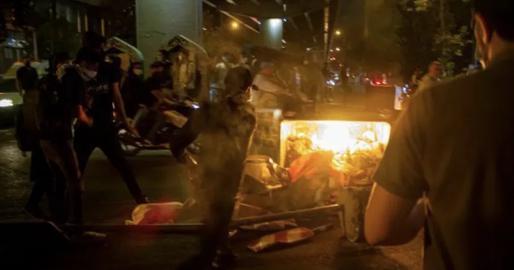
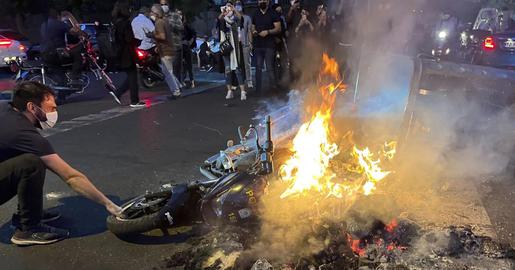
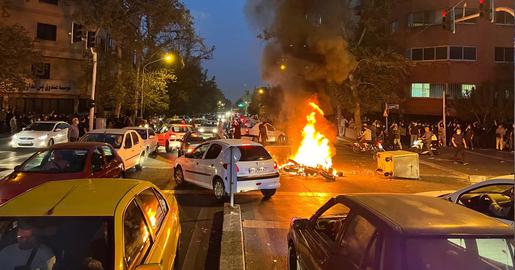

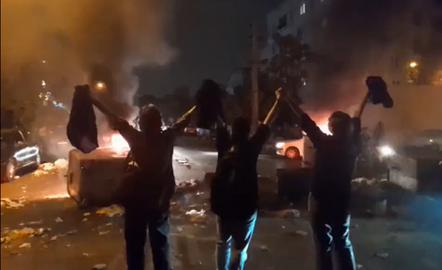
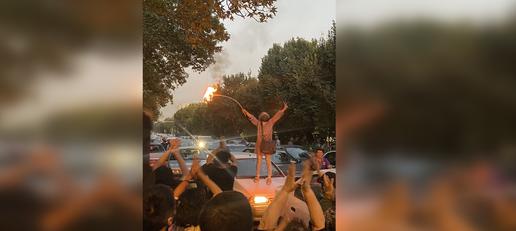
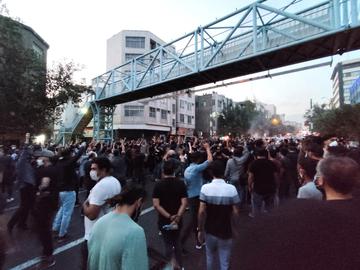
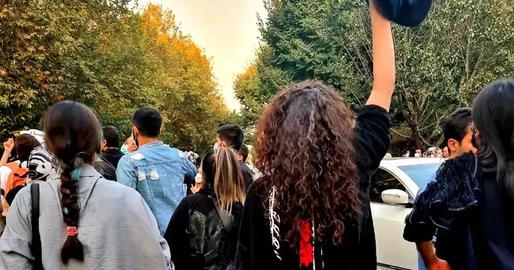

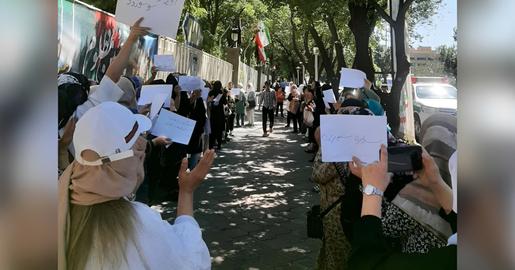








comments